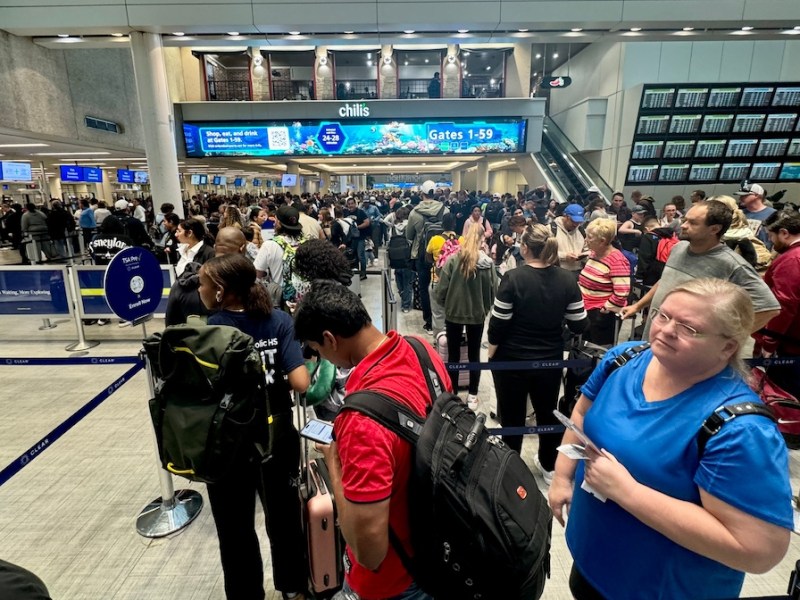Millions of low-income Floridians who receive food stamp benefits through the federal Supplemental Nutrition Assistance Program (SNAP), including veterans and the elderly, could see their benefits for November delayed if the U.S. government shutdown stretches into November — and Florida Democrats are calling on Republican Florida Gov. Ron DeSantis to take action.
“Nearly 3 million Floridians who rely on SNAP benefits are at risk of going hungry on November 1, including 1.5 million children,” Florida Democratic Party chair Nikki Fried said in a statement.
“Governor DeSantis can stop this, especially as the holidays approach. For the price of shutting down Alligator Alcatraz, he can ensure that Florida families have food on the table this Thanksgiving,” she added, referring to an immigrant detention camp in the Everglades that has faced harsh rebuke and legal challenges from environmental groups and immigrant rights advocates.
Florida is one of at least 25 states across the U.S. that have warned of upcoming delays or missing payments to SNAP beneficiaries if Congress doesn’t agree on a federal budget, Politico reported.
During the last government shutdown in 2018, also under President Trump, the federal government disbursed SNAP benefits early, in order to avoid this potentially-devastating scenario. That’s off the table this time around.
“If the federal government shutdown continues into November, SNAP benefits for the month of November will not be issued until federal funding is restored,” the Florida Department of Children and Families, the state’s administration of the SNAP program, warns on its website.“You may receive notices about your eligible benefit amount, but you will not receive any benefits deposited to your EBT card during this time.”
Florida Rep. Anna Eskamani, a progressive Democrat from Orlando, said it’s “easily” within the power of DeSantis to take action.
“If you are governor, you could easily call for a state of emergency on hunger, on food insecurity, and then allocate your emergency dollars like he’s been doing for immigration,” Dr. Eskamani told Orlando Weekly in a phone call. “It really just comes down to, you know, prioritization.”
Under Florida statutes, a state of emergency “must be declared by executive order or proclamation of the Governor if she or he finds an emergency has occurred or that the occurrence or the threat thereof is imminent.”
DeSantis most recently expanded a state of emergency order pertaining to hurricane preparedness to immigration in order to build the immigrant detention camp in the Florida Everglades, dubbed “Alligator Alcatraz.”
Eskamani said that DCF could also request emergency state funding from the Florida Legislature in order to fill the federal funding gap and, consequently, the bellies of low-income adults and families who benefit from the program.
“If state government wanted to cover the gap — we absolutely could.”
Rep. Anna Eskamani
“I would argue that with the type of money that Florida has already spent on immigration enforcement, we absolutely — if we wanted, if state government wanted to cover the gap — we absolutely could,” she said.
U.S. Congressman Maxwell Frost, D-FL, similarly penned a letter to Gov. DeSantis Thursday, as well as Florida House speaker Daniel Perez and Senate president Ben Albritton, urging them to call for a special legislative session to come up with legislation that would fund SNAP benefits for Florida families.
“I am calling on the Trump Administration to continue to provide Supplemental Nutrition
Assistance Program (SNAP) benefits during the government shutdown. But our residents deserve a plan in the case that President Trump lacks the willingness to deliver,” Frost wrote.
“With the Republican Congress and Republican President sentencing the nearly 42 million Americans in need of SNAP to food insecurity, it is necessary that Florida’s state government does not second this indifference to the suffering and slow violence of that food insecurity,” he added.
A ‘precarious position’
The Florida Department of Children and Families is the state administrator of SNAP, a welfare program funded by the U.S. Department of Agriculture that is meant to help low-income families afford food. Critics of welfare have disparaged the program as a costly “handout,” while welfare advocates argue that the benefits are insufficient, since they’ve failed to keep up with rising food costs.
The federal government shutdown began Oct. 1 when Congress was unable to pass a federal budget. Democrats are demanding Republicans agree to extend enhanced tax credits that have made health insurance through the Affordable Care Act marketplace more affordable for millions of Americans, while Republicans have denied requests to negotiate until the government reopens.
Without the extension of the ACA subsidies, monthly healthcare premiums for Americans who don’t receive insurance through an employer or other government program could more than double. The cost of employer-provided healthcare is also projected to rise at the fastest rate in 15 years, due in part to expiring federal tax credits.
“At the end of this year, if Congress doesn’t do its job, we are going to see 25 million Americans have their healthcare costs go up anywhere from 50 to 300 percent,” Congressman Frost said at a recent Healthcare Over Billionaires rally at an Orlando union hall.
That could amount to hundreds, or even thousands of dollars more for health insurance per year, according to a KFF analysis.
Yet, if the government shutdown continues, the ability of more than 40 million Americans, including 2.8 million Floridians, to buy food through SNAP is also at risk. “We know supports like food stamps and housing subsidies help many low-wage working families to maintain housing stability,” Martha Are, CEO of the Homeless Services Network of Central Florida, told Orlando Weekly.
“Families that are facing the loss of one or both of these benefits will absolutely be at greater risk of becoming homeless,” she said.
Qualifying households for SNAP include individuals and families earning up to 200 percent of the federal poverty level — equal to $31,300 for an individual or $64,300 for a family of four. In Florida, most SNAP recipients are also subject to stringent work requirements, with the exception of people with disabilities, students, and parents or guardians of young children.
Formerly known as food stamps, SNAP can serve as a lifeline for low-income adults and families who can’t afford to buy groceries (remember the peak cost of eggs?) otherwise. Are worries that the program’s delay could force families into difficult spending decisions. Do I pay my rent this next month, or do I keep my child’s belly full?
Beneficiaries who are already experiencing homelessness, she said, “will be left in the precarious position of trying to access food pantries and soup kitchens to avoid going hungry — time they could have spent looking for work or housing.”
Stephanie Palacios, director of advocacy and government relations for Central Florida’s largest hunger relief organization, Second Harvest, admitted that a freeze on SNAP benefits would “have a huge impact.”
“One in seven Central Floridians is food insecure, and one in six of those individuals are children,” Palacios pointed out in a phone call. “So these are our neighbors, these are families who are working one and two jobs, or seniors who are homebound, or seniors who are on a fixed income and may not be able to adjust to high grocery prices at the grocery store.”
Second Harvest, an affiliate of Feeding America, has contracted with DCF since 2008 to help low-income Floridians apply for SNAP benefits, so they’re well aware of the stakes. The nonprofit distributes enough food for about 300,000 meals per day through their main warehouse on Mercy Drive and through partner agencies throughout the region.
Over the course of the government shutdown, Palacios said their partners have seen “a heightened need already,” but emphasized that they’re here to support Central Floridians, including SNAP recipients, who find themselves in need. “We’re committed to sourcing additional food as funds and community resources become available,” she said.
Will Gov. DeSantis act?
The Executive Office of the Governor, when asked about the possibility of a state of emergency over the issue, simply told Orlando Weekly that staff had forwarded our questions to DCF. Florida DCF did not respond to our request for comment on whether they planned to request emergency state funding in time for publication.
The SNAP program works by delivering benefits electronically to recipients onto an EBT card. Florida DCF notes that there “are no anticipated impacts” to October benefits.
The department will also continue to process and accept new applications, even if the government shutdown — the second-longest in U.S. history so far — continues.
At least 750,000 of the federal government’s 2.1 million workers, meanwhile, have been furloughed without pay, as hundreds of thousands of others — save for a few Trump-favored exceptions — have been forced to continue working, also unpaid. In Central Florida, tens of thousands of federal workers are impacted.
“The Trump Administration wants every federal worker to be paid — that’s why we have repeatedly urged the Democrats to reopen the government and stop hurting the American people,” a White House spokesperson told the Washington Post, in response to criticism over Trump authorizing funding to pay some, but not all, federal employees during the shutdown.
“The Trump Administration is working day and night to mitigate the pain Democrats are causing — including by paying the troops and funding food assistance for women and children,” the spokesperson claimed.
According to the nonpartisan Center on Budget and Policy Priorities, more than half of Florida’s SNAP participants are in families with children, and nearly three-quarters (74 percent) have a total household income below 100 percent of the federal poverty level, equal to $32,150 for a family of four.
Where to find help
Second Harvest has an online tool for Central Florida residents who are searching for a nearby food pantry. Here’s what you can do to find a food pantry (and hours of operation) near you:
- Go to feedhopenow.org
- Click on the “Find Food” tab. This will direct you to their Food Finder (that’s also available at feedhopenow.org/find-help/food-finder/)
- Enter your ZIP code and your address to find a food pantry near you, including a phone number to call if you have any questions.
Subscribe to Orlando Weekly newsletters.
Follow us: Apple News | Google News | NewsBreak | Reddit | Instagram | Facebook | Bluesky | Or sign up for our RSS Feed
Related
Source link


